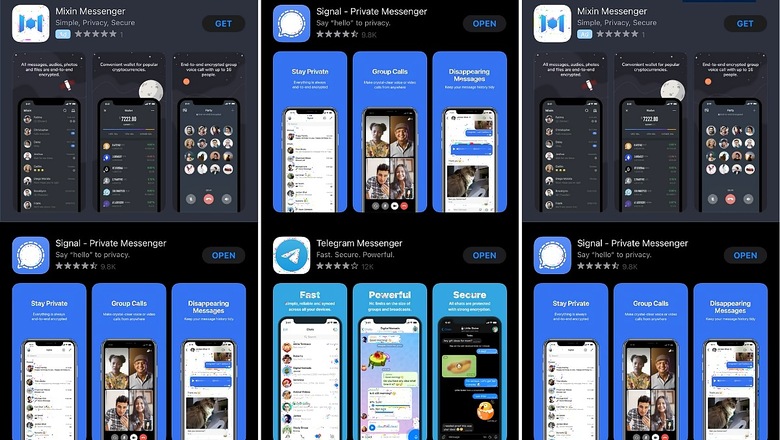
views
At a time when the Signal instant messaging app is reporting a surge in new signups and new users as a lot of WhatsApp users have even spooked by the new privacy policy for the app, it has climbed to the top of the charts on the Apple App Store in many countries, including India, at the time of writing this. However, a little bit of responsible tweeting might be in order for Signal on their official @signalapp Twitter account. In a tweet posted a while ago, Signal says that Facebook has somehow got a hand in manipulating the search results on the Apple App Store, when users search for the Signal app, and pushed the Facebook Messenger app to the front of the search results. Yes, these are exciting times and all, but not everything that you see may be a conspiracy. Signal says Facebook is pushing the Messenger app ahead of Signal on Apple’s app platform. It absolutely isn’t true.
In a tweet, @signal app says, “Facebook is probably more comfortable selling ads than buying them, but they’ll do what they have to do in order to be the top result when some people search for ‘Signal’ in the App Store.” This tweet also carries a photo of the search result page on the App Store for the Apple iPhone, where the Facebook Messenger app, or simply Messenger, is listed as the top result. Signal, an instant messaging app developed by the nonprofit Signal Foundation, is a rival for instant messaging apps owned by Facebook, including WhatsApp and Facebook Messenger. Signal didn’t bother talking about the minor details in their latest tweet.

First up, what they see and what users often see on a search result page on the App Store is an advertisement of an app often similar to the one you have searched for. There isn’t any malice in this ad placement, as Signal seems to be alleging about Facebook and indeed Apple. It is based on algorithms and often avoids ads that you may have already seen earlier to suggest new apps. These ads are given a different colour treatment and clearly marked as “Ad”.
Secondly, we noticed that when we searched for the Signal app multiple times on different iPhones signed in with different iCloud IDs, we saw some other app ads on the top of the search page for the Signal app and after a few searches, the ads disappeared from the search page completely. This was also true when we used the same search pattern for some other apps as well. In our search for the Signal app, we saw ads for the Forex Daily Signals app (this has something to do with forex trading) and twice for the Mixin Messenger app. Incidentally, this app is built on the Signal protocol with end-to-end encryption. Always, and this was without fail, the Signal app was the first actual search result below the ads. Ads in searches are common, including on Google Search on the web.
Once the ads disappeared after a few search attempts, the Signal app led the way for the search, as it should. On the results page, which shows other search results that are based on keywords, app types and suggestion linking, the Signal app was followed by Telegram Messenger, Google Chat, Investmate, Session – Private Messenger, Naughty Dating – Adults Fun, Viber Messenger, Hangouts by Google, Skype for iPhone, BOTIM – video calls and chat, Microsoft Kaizala, LINE and then Messenger by Facebook.
It really is hard to see a conspiracy, as Signal seems to be alleging. At no point did we see Messenger being advertised in the search results.
At this time, Signal is also leading the race in the Top Charts for apps on the Apple App Store in India. It is followed by Telegram Messenger, WhatsApp Messenger, YouTube, Instagram, Facebook, Google Pay, Snapchat and PhonePe. No conspiracy there, then?
Signal’s popularity on the charts doesn’t come as a surprise. It comes just after WhatsApp confirmed the new Privacy Policy and Terms of Service. While a lot of what is in the new terms has already been known, WhatsApp is now spelling it out clearly that user data is and will continue to be shared with Facebook and other Facebook products as well as services. WhatsApp also says that it tracks user location data at all times, and even if you are smart enough to turn off location access for WhatsApp on your Android phone or Apple iPhone, the app still collects and logs IP addresses and phone number codes to estimate your general location—WhatsApp says this is for diagnostics and troubleshooting.
Apple, after they rolled out the new Privacy Labels on the App Store for the iPhone, iPad and Mac, now mandate app developers to clearly state what user data they collect or don’t collect from users. The App Store Privacy Labels will have three sections—Data used to track you, data linked to you and data that is not linked to you. Under each section will be bullet points listing the exact specifics about the data being collected, including contact info, health and fitness data, financial info, usage data, browsing history, location data, personal identifiers and search history. With this information available at a glance, a user can potentially make a more informed decision about whether they want to download a specific app on the iPhone or iPad or Mac, without falling down the data collection and privacy blackhole that became the norm over the years.
In the subsequent revelations, it turns out that WhatsApp and Facebook Messenger collect significantly more user data in comparison with similar instant messenger apps such as Signal and Apple’s own iMessage. This includes health and fitness data, financial info, search history, user content, browsing history and location data. Signal app does not collect any user data, as per the App Store Privacy Labels.
Read all the Latest News, Breaking News and Coronavirus News here




















Comments
0 comment